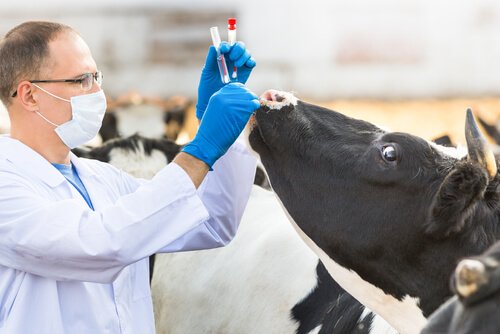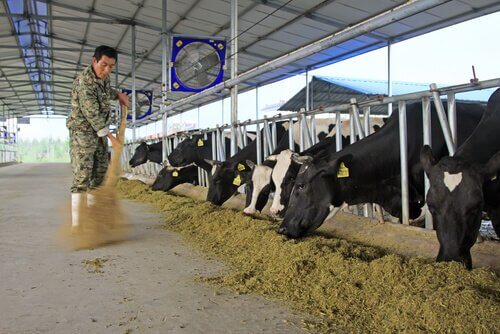Pharmacological Products for Farms


Written and verified by the biologist Paloma de los Milagros
Every farm requires an arsenal of preventive and basic care measures to ensure that its animals are free of disease. Pharmacological products are part of this arsenal. Furthermore, these are essential in the prevention and cure of possible, common diseases that roam around farms.
Pharmacological products are part of the basic equipment of a farm. Moreover, for their proper selection and delivery, the owner of the farm must have consulted a veterinary and have his advice –as per the established local laws and species of the animal to be treated.
These types of products, known as veterinary medicinal products, are intended to prevent and treat any diseases which may be caught by farm animals. Particularly if the animals are farmed for human consumption.

Classification of veterinary pharmacological products
Depending on their properties, pharmacological products can be classified in:
- Antibiotics to fight diseases caused by bacteria, fungi, and viruses.
- Antiparasitic agents to prevent and eradicate the presence of parasites.
- Dead or inactivated vaccines, or live or attenuated ones. These introduce a virus, bacteria or toxin -produced by a germ- into an animal. Furthermore, veterinarians will administer antibiotics to enable the immune system of an animal to respond to a threat. And, subsequently, they produce the necessary antibodies to be ready for a future epidemic.
Route of administration
- Orally, as is the case with most antibiotics.
- Intravenously, as with vaccines.
- And also, cutaneous, via fumigation, etc to a lesser extent.
In regards to antibiotics and vaccines, their selections will depend on the instructions given by the veterinarian to care for each category of animal. However, among the antiparasitic pharmacological products, which may be of interest on a farm, the following generally stand out:
- Cattle lice control: The active ingredient in these compounds is cypermethrin. And, depending on the species and weight of the animal, the chemical will be administered semi-diluted every month throughout their body.
- Zooveca is a treatment for flies, lice, ticks, mites and their larvae on livestock farms. You apply it cutaneously, via baths or sprayed throughout the body of the animal with the highest or lowest concentration of these pests, depending on the pest targeted.
Furthermore, by way of an example, the Ministry of Health and Consumer Affairs in Spain offers a series of tri-fold brochures, with information about the use of pharmacological products on farms for both veterinary and livestock staff at a national level.
The tri-fold brochures emphasize the responsible use of these products, since no pharmaceutical product is safe, antibiotics in particular. They can cause alterations in animals which will then end up on the plate (and in the body) of the end consumer.

Other measures to take into account
However, we need to go beyond the pharmacological products that veterinary professionals provide. And we need to do so according to the species and specific characteristics of each livestock category.
Hygiene and safety in livestock farming
Most importantly, the owner of any farm must emphasize a series of protocols concerning the biosecurity of facilities aimed at:
- Water quality: farms must have adequate water filtering systems and carry out physicochemical and microbiological checks on a regular basis, mainly due to contamination with Coliform bacteria, which is common in pig waste.
- Cleaning and disinfection of enclosures: this is essential to prevent, among other things, cross-contamination between different groups of animals. For both processes to be effective, the chemical and mechanical means used are equally important, as is the temperature and times of action.
- Livestock staff hygiene: should be as strict as possible as a preventive measure of an outbreak of disease inside and outside a farm.
All cited sources were thoroughly reviewed by our team to ensure their quality, reliability, currency, and validity. The bibliography of this article was considered reliable and of academic or scientific accuracy.
- Ministerio de Sanidad, Consumo y Bienestar Social. (2017). Farmacovigilancia de medicamentos veterinarios. Recuperado de https://www.aemps.gob.es/vigilancia/medicamentosVeterinarios/
- Zotal Laboratorios. (2016). Productos farmacológicos veterinarios que puedes necesitar en tu granja. Recuperado de http://www.zotal.com/productos-farmacologicos-veterinarios-puedes-necesitar-granja/
This text is provided for informational purposes only and does not replace consultation with a professional. If in doubt, consult your specialist.